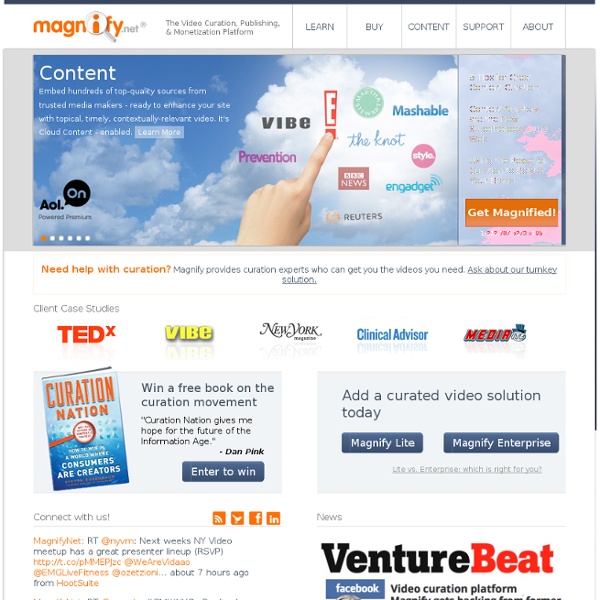



Techmeme Magnify Blog Trunk.ly - The easiest way to save links online. Welcome Welcome To MySyndicaat :: NewsMastering that Works! 4 Promising Curation Tools That Help Make Sense of the Web Steven Rosenbaum is a curator, author, filmmaker and entrepreneur. He is the CEO of Magnify.net, a real-time video curation engine for publishers, brands, and websites. His book Curation Nation is slated to be published this spring by McGrawHill Business. As the volume of content swirling around the web continues to grow, we're finding ourselves drowning in a deluge of data. Where is the relevant material? Where are the best columns and content offerings? The solution on the horizon is curation. In the past 90 days alone, there has been an explosion of new software offerings that are the early leaders in the curation tools category. 1. Storify co-founder Burt Herman worked as a reporter for the Associated Press during a 12-year career, six of those in news management as a bureau chief and supervising correspondent. At the AP, editors sending messages to reporters asking them to do a story would regularly write, “Can u pls storify?” Storify is currently invite only. 2. 3. 4. Conclusion
CurationSoft Content Curation Software Why publish science in peer-reviewed journals? The recent announcement of a new journal sponsored by the Howard Hughes Medical Institute, the Max Planck Society, and the Wellcome Trust generated a bit of discussion about the issues in the scientific publishing process it is designed to address—arbitrary editorial decisions, slow and unhelpful peer review, and so on. Left unanswered, however, is a more fundamental question: why do we publish scientific articles in peer-reviewed journals to begin with? What value does the existence of these journals add? In this post, I will argue that cutting journals out of scientific publishing to a large extent would be unconditionally a good thing, and that the only thing keeping this from happening is the absence of a “killer app”. Google Scholar in 2015? The publishing process as it stands currently The problems with this system have been pointed out ad nauseam; the most succinct statement of the issues I’ve seen is in a nice commentary by former British Medical Journal editor Richard Smith. 1.